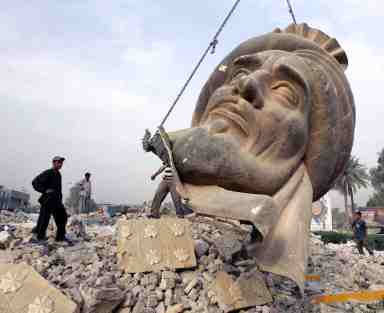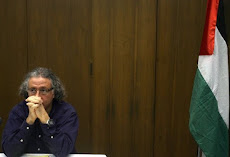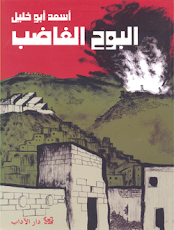 Who Tried to Kill the very dead Abu Ja`far Al-Mansur? This is a news story that no US media will notice. The statue of Abu Ja`far Al-Mansur (d. 775 AD), the second `Abbasid caliph, and the builder of Baghdad, was bombed in Baghdad yesterday. The identity of the culprits is not known. It is not clear whether extremist Shi`ites or extremist Sunnis were behind the bombing. You can make scenarios for why this or that group was behind the bombing. It will be a mystery, in the absence of a claim of responsibility. Was it symbolic, or were the culprits knowledgeable of Iraqi history, and the specific role of Abu Ja`far? Abu Ja`far of course succeeded his brother As-Saffah as caliph of the empire. This skillful politician was also ruthless and brutal. But he was not immodest. According to Malik ibn Anas, Al-Mansur agreed when told that Abu Bakr and `Umar were the best people, after the Prophet. For some reason Arab sources often liked to mention that Abu Ja`far's mother was a Berber, not an Arab. As-Siyuti in Tarikh Al-Khulafa' says this about him: "He killed plenty of people until his kingship was consolidated." His relationship with Imam Abu Hanifah was quite complex; and he later had him arrested, and had him killed (by poisoned sherbet [the word sherbet is from the Arabic word sharabat--beverages] according to some accounts). Abu Hanifah's crime was either that he did not legitimize the rule of Al-Mansur or that he permitted dissent against the caliph. Abu Ja`far was very miserly with money, and often had patches on his garbs. He was nicknamed in his time and in the old sources Abu Ad-Dawaniq. (Plural of daniq, which is 1/6th of dirham, and sometimes used to refer to 1/6th of Dinar. The plural of dawaniq is an odd form according to Sibawayh.
Who Tried to Kill the very dead Abu Ja`far Al-Mansur? This is a news story that no US media will notice. The statue of Abu Ja`far Al-Mansur (d. 775 AD), the second `Abbasid caliph, and the builder of Baghdad, was bombed in Baghdad yesterday. The identity of the culprits is not known. It is not clear whether extremist Shi`ites or extremist Sunnis were behind the bombing. You can make scenarios for why this or that group was behind the bombing. It will be a mystery, in the absence of a claim of responsibility. Was it symbolic, or were the culprits knowledgeable of Iraqi history, and the specific role of Abu Ja`far? Abu Ja`far of course succeeded his brother As-Saffah as caliph of the empire. This skillful politician was also ruthless and brutal. But he was not immodest. According to Malik ibn Anas, Al-Mansur agreed when told that Abu Bakr and `Umar were the best people, after the Prophet. For some reason Arab sources often liked to mention that Abu Ja`far's mother was a Berber, not an Arab. As-Siyuti in Tarikh Al-Khulafa' says this about him: "He killed plenty of people until his kingship was consolidated." His relationship with Imam Abu Hanifah was quite complex; and he later had him arrested, and had him killed (by poisoned sherbet [the word sherbet is from the Arabic word sharabat--beverages] according to some accounts). Abu Hanifah's crime was either that he did not legitimize the rule of Al-Mansur or that he permitted dissent against the caliph. Abu Ja`far was very miserly with money, and often had patches on his garbs. He was nicknamed in his time and in the old sources Abu Ad-Dawaniq. (Plural of daniq, which is 1/6th of dirham, and sometimes used to refer to 1/6th of Dinar. The plural of dawaniq is an odd form according to Sibawayh.يا قوم, من يعذر من عجرد ألقاتل المرء على الدانق؟
He was known to ask for accounting of every daniq, according to accounts. But it can easily be said that he founded the Abbasid state, as Philip Hitti notes in his History of the Arabs--which despite methodological problems is far superior to Albert Hourani's History of the Arab Peoples. He alienated (to this very day?) many peoples. He alienated the Persians when he killed Abu Muslim Al-Kharasani (read the novel on his life by Jurji Zaydan) after using him and taking him as his close advisor. He invited him to his court, and then ordered that he be attacked with swords (see At-Tabari's account). And when a new sect, Ar-Rawandiyyah, declared Abu Ja`far himself as its God, he was furious. He persecuted and killed its members (see Al-Mas`udi's account). But he also changed the relationship between the newly founded `Abbasid state and the descendants of `Ali when he killed Muhammad An-Nafs Az-Zakiyyah (the pure souled), who was the son of `Abdullah, the grandson of Hasan Ibn `Ali. Siyuti says about that: "He was the first to cause sedition between the `Abbasids and the `Alids, while they were one thing before that." Abu Ja`far also imposed a dress code on his people, leading Abu Dalamah to say:"
وكنا نرجي من إمام زيادة فزاد الإمام المصطفى في القلانس
Abu Ja`far also wrote poetry (not good):
إذا كنت ذا رأي فكن ذا عزيمة فان فساد الرأي أن تترددا
Ibn Qutaybah in Al-Imamah wa-s-Siyasah has an interesting story about Abu Ja`far and Ibn Marzuq (his first political prisoner perhaps). When Ibn Marzuq challenged the caliph publicly, Abu Ja`far had him arrested, and yet would summon him at night to spend time with him, and on and on. In 762, Al-Mansur put the first stone for the building of the new capital of Baghdad. But there was an old location near Baghdad that was known in Sasanian times as Baghdad (see Al-Ya`qubi). When Baghdad was being constructed, Al-Mansur said: "This is a good site for an encampment." It took 4 years to build Baghdad and it cost around 400,883,000 million dirhams. It required the work of 100,000 engineers, scientists and construction experts, who were brought in from Syria and Iraq and other places around the empire. He called his city the City of Peace, and it was built in round concentric circles, and for that was known as the Round City. He had four gates made for the city, and one was known as the Golden Gate because it was made of gold--did you guess that? Abu Mansur was the first caliph to rely on the advise of astrologers, and the official astrologer assured him that great things will happen in Baghdad (he did not predict Bush or Saddam). Al-Mansur died while on his way to perform the pilgrimage. And when he died, says Ibn Al-Athir, they dug 100 graves for him near Mecca to confuse people. But he was secretively buried somewhere else so that his enemies would not harm him in death. So who really bombed the statue of Al-Mansur? Well, it is obvious. It could be the Iranians who were mad at what he did to Abu Muslim Al-Kharasani; or it could be the Shi`ites for what he did to Muhammad An-Nafs Az-Zakiyyah; or it could be the Sunnis for what he did to Abu Hanifah; or it could be supporters of Rawandiyyah for what he did to followers of the sect; or it could be Kurds who did not like the Arab imprint of the legacy of the caliphate (which had much more than an Arab imprint of course); or it could be the Americans who wanted to change the history of Iraq. Or it could be somebody who does not know much about history, and he/she thought that this was a statue of Saddam or of Bush?








